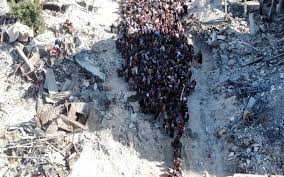
World Genocide Commemoration Day: A Mockery of Humanity in Gaza
Mehvish Mushtaq
On December 9, the world will observe the World Genocide Commemoration Day, a date enshrined by the United Nations to honor the victims of genocides past and present and to reaffirm a collective commitment to prevent such horrors from recurring. However, this day does not hold any significance in a world where atrocities in Gaza unfold before our eyes, unabated, with the very institutions meant to uphold humanity’s dignity standing as silent witnesses—or worse, complicit actors. Since October 2023, Gaza has been subjected to an unrelenting assault, euphemistically labeled as a “war” but resembling a systematic annihilation of an entire population. This is not a conflict between equals. It is a colonial enterprise, executed with the ferocity of modern military technology, crushing a besieged civilian population. Gaza, an open-air prison with over two million inhabitants, half of whom are children, is continuously being bombed indiscriminately. Hospitals have been reduced to rubble. Entire families have been erased in seconds. The numbers are staggering: tens of thousands dead, countless injured, and many more displaced. But these are not just numbers—they are lives, dreams, and futures obliterated under the guise of “self-defense.” Gaza’s children, whose only crime was being born under an occupation, are buried under debris and their cries are drowned by the deafening roar of apathy from those who claim to champion human rights.
If the UN was established to ensure “never again,” then its inaction in Gaza is proof that this mantra has become a sickening lie. For decades, the UN has postured as the guardian of human dignity and on the other hand it has repeatedly demonstrated selective morality. While it churns out resolutions and statements, the people of Gaza are left wondering: where is the justice?
The United Nations today resembles a hollow edifice—an institution eroded of its credibility, propped up by lofty words that fail to translate into meaningful action. Its agencies, which should be mobilized to prevent atrocities, issue tepid condemnations or, worse, sit idly as genocide unfolds. Why does the UN fail? Because it lacks the spine to stand against powerful states and their allies. Its moral compass is swayed by the geopolitical winds, selectively pointing towards causes that serve the interests of the powerful.
The assault on Gaza is, without an iota of doubt, tragic and criminal. Targeting civilian infrastructure, cutting off essential supplies like food, water, and electricity, and employing collective punishment are war crimes under international law. Yet, the perpetrators walk free and are shielded by the political might of their allies. The International Criminal Court, too, remains conspicuously absent and it definitely tells us about a global justice system that bends for the strong and snaps for the weak.
When hospitals become graves and schools become ash, when ambulance drivers and aid workers are targeted, the question arises: how is this not genocide? The deliberate attempt to annihilate a people, to erase their culture, history, and future, meets every definition of the term. And yet, the world hesitates and is afraid to name the crime for what it is. The stark hypocrisy of international institutions lies in their selective outrage. Compare the global response to crises elsewhere: the swift action, the boycotts, the sanctions etc. In Gaza, however, the victims are not afforded the same humanity. Their suffering is minimized, their deaths are rationalized and their cries are ignored. What makes the children of Gaza less deserving of life? What makes their tears less urgent? This selective sympathy is a stain on the conscience of the global community.
On this day called World Genocide Day, we must not forget the bitter irony of the UN’s existence. This is the same institution that has failed to implement its own resolutions on Kashmir, where generations have endured a brutal occupation.
World Genocide Commemoration Day should be a day of reflection, but for the people of Gaza, it will be another day of grief. As the bombs continue to fall and the world’s indifference grows louder, one cannot help but wonder if the promise of “never again” was ever meant for them. And what of the UN? An institution, or rather a theater of inaction, where lofty speeches echo in chambers that have long ceased to matter. The world doesn’t need another day of commemoration. It needs accountability. But until that day comes, the victims of Gaza will remain a testament to the UN’s most profound failure—its betrayal of humanity itself.



